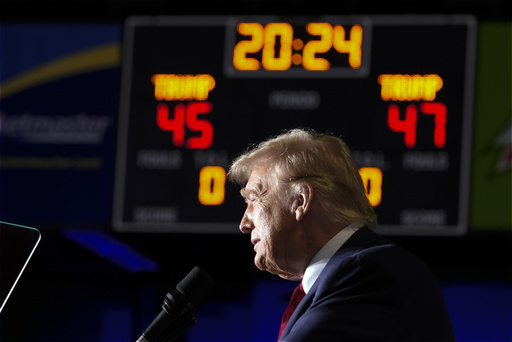
Donald Trump is set to hold daily rallies in North Carolina as the countdown to Tuesday’s election intensifies. This active campaign effort underscores the significance of North Carolina, the sole swing state that Trump successfully carried in both his previous bids for the presidency in 2016 and 2020.
Despite making trips to New Mexico and Virginia—two states typically leaning Democratic and perceived as challenging for his campaign—Trump’s focus remains heavily on North Carolina. The state has not favored a Democratic presidential candidate since Barack Obama in 2008.
Losing North Carolina could severely complicate Trump’s journey toward securing the necessary 270 electoral votes for the presidency. In the last election, he achieved a narrow victory here over Joe Biden by just 1.3 percentage points, marking it as his least favorable margin of triumph among the states.
On Saturday, Trump plans to conduct rallies in Gastonia, close to Charlotte, and Greensboro, with a stop in Salem, Virginia, in between these events. He will proceed to hold rallies in Kinston and Raleigh on Sunday and Monday. By the end of these appearances, he will have engaged in nine campaign events across North Carolina since the beginning of October. His running mate, Ohio Senator JD Vance, has also actively participated in the state, visiting six times recently.
Vice President Kamala Harris, representing the Democratic side, will also be present in North Carolina on Saturday for a concert and rally in Charlotte, though her campaign has not disclosed any further plans for the state as Election Day approaches.
The ongoing aftermath of Hurricane Helene has created a level of unpredictability in Western North Carolina, where flooding has led to destruction and displacement in various counties. This situation adds complexity to the electoral dynamics, including in liberal Asheville and the adjacent conservative rural areas.
Trump’s team has expressed confidence in their prospects in North Carolina, although Democrats interpret Trump’s focused campaigning there as a sign of optimism for Harris. Democratic state Representative Marcia Morey from Durham commented that Trump’s repeated visits might indicate trouble for his campaign, noting that his inflammatory rhetoric could backfire and alienate voters.
Jason Miller, a senior adviser to Trump, dismissed concerns regarding their campaign strategy. He emphasized the team’s confidence and asserted that they are following a well-researched plan aimed at surpassing the necessary electoral threshold, potentially capturing unexpected states as well.
Current data shows that around half of North Carolina’s 7.8 million registered voters had participated in early voting by Friday. The early in-person voting period concludes on Saturday afternoon, and North Carolina Republicans are feeling optimistic due to a surge in early turnout prompted by a new strategy emphasizing early voting rather than just focusing on Election Day.
As the campaign nears its conclusion, over 50,000 more registered Republicans have voted early or by absentee ballot compared to Democrats, despite Democrats having a larger overall registration in the state. However, it remains uncertain if this early voting trend will translate into higher overall turnout for Trump.
Independent voters now represent the largest demographic of registered voters in North Carolina, a group that Trump lost ground with between the 2016 and 2020 elections. Additionally, North Carolina voters have shown a tendency to split their ticket, which explains the GOP control of the state legislature since 2011 despite the Democrats maintaining the governor’s office for most of the last three decades.
In recent weeks, the Republican Party’s hopes for victory have faced challenges following controversial revelations about their gubernatorial nominee, Lt. Gov. Mark Robinson. A report alleged he engaged in inappropriate online behavior on a pornographic message board over ten years ago. Despite Robinson’s denials and defamation lawsuit against CNN, the controversy has raised concerns about a potential Democratic surge led by Josh Stein, the state’s attorney general, which might adversely affect other Republican candidates in the elections.
